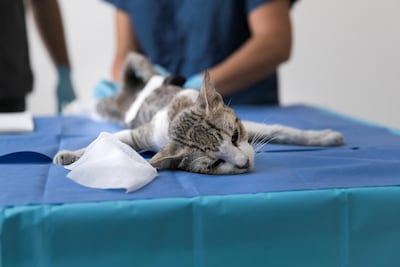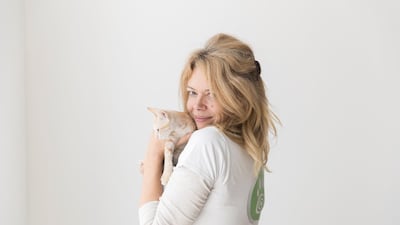The biog:
From: Wimbledon, London, UK
Education: Medical doctor
Hobbies: Travelling, meeting new people and cultures
Favourite animals: All of them
Dr Susan Aylott jokes that every time she went out looking for a job when she arrived in Abu Dhabi 10 years ago, she came home with a kitten.
The doctor, who once specialised in ear, nose and throat research, fully intended to work but could not find any roles at the time – just a lot of sick cats. So she filled her days with caring for animals.
“I would have liked to have become a vet, but it just wasn’t possible for me: I would have ended up mortgaged to the hilt and in financial difficulty. So I ended up becoming a doctor,” said Dr Aylott, from the UK.
From her very earliest days in Abu Dhabi, she did what she could for stray cats, but around two and a half years ago she stepped up her game.
“I was on Lulu Island one day and I saw a cat walking on the beach and it was very sick. It was dragging its back legs, so I went to investigate. And I found 27 other cats there,” she said.
“So that got me started. We set up a feeding station and sterilisation programme on Lulu Island and then realised that these things could benefit the mainland, too.”
And Animal Welfare Abu Dhabi was born.
Her group now has hundreds of helpers who help take care of some of the city’s estimated 100,000 stray cats via a network of feeding stations. She has found many, if not most, of them through word of mouth.
“When people see someone going to feed a cat they come over and wonder what you are doing, and when you explain they say 'goodness, I would love to join'. People see what we do on the streets, because we have a big presence there," said Dr Aylott.
There are five volunteers for each feeding station to ensure that it remains sustainable.
“What we had before was one person responsible for feeding 25 cats. And because of the transitional nature of [the UAE], people would disappear off and then contact us and say that there are 25 cats that need feeding,” she said.
Because the group does not accept donations, it means that the helpers can all share the cost of the food and with so many the burden is minimal.
“The government has a great initiative of trap, neuter and release, which is an internationally-recognised way of dealing with population control,” she said.
“We liaise with these government programmes and also we do them ourselves to be sure that we have healthy and stable colonies all across Abu Dhabi.”
__________
Read more:
Pets in the UAE: How a shifting attitude is seeing more places become animal-friendly
More animal shelters and new laws for strays in Abu Dhabi
150 cats removed from villa
__________
Animal Welfare Abu Dhabi does not, as a rule, rehome cats as there are too any to help. So Arabian Maus, the breed of cat most often seen on the streets, are often left there if they have access to food, water, safety and shelter.
And she has also helped establish special feeding centres for cats at the Etihad Headquarters, where the entire community of cats have been sterilised. A number of centres have also been established at hotels, including Danat Jebel Dhanna Resort in Al Ruwais.
“The hotels get positive trip adviser reviews and it is starting to change the mindset of people, which is good,” she said.
“There seems to be a slight competition between hotels about who can create the best feeding stations, which is nice. Capital Grand has a fantastic feeding station – that’s one of the biggest. Now we have Ruwais coming up with a new design. But it’s nice because it creates healthy competition for the right reasons. It really works,” she said.
The group has also established mobile clinics staffed by volunteer vets to check the health of cats and sterilise them to ensure the colony does not grow further. It held one of its mobile clinics recently in Al Ruwais.
“We saw 50 cats in two days — they have a big problem. There is no veterinary practice there. The fields clinics really help in these remote areas,” said Dr Aylott.
“We take our vets to the animals, which is better than the other way around because it’s less stressful for the animals. The hotel sponsored us and kindly accommodated us so we were able to neuter 50 of their cats in the field clinic.”
Although cats are a big feature for Animal Welfare Abu Dhabi, they are not the only animals the group helps. It has dealt with many more exotic creatures, including ostriches, baboons, African grey parrots and a giant African tortoise, which was in need of a new home.
“We deal with some abuse cases as well. We always report to the relevant authorities for things like that,” she said.
Education is a big part of Dr Aylott’s vision for the group. And it works with companies and schools regularly to that end.
“We have a schools’ programme where the children have feeding stations. We have a mosque programme where the imams assist the children to feed the cast, and they also have the animals sterilised,” she said.
“It brings communities together.”
Rooney's club record
At Everton Appearances: 77; Goals: 17
At Manchester United Appearances: 559; Goals: 253
UAE currency: the story behind the money in your pockets
UAE currency: the story behind the money in your pockets
The specs
Engine: Four electric motors, one at each wheel
Power: 579hp
Torque: 859Nm
Transmission: Single-speed automatic
Price: From Dh825,900
On sale: Now
Company%20profile%20
%3Cp%3E%3Cstrong%3EName%3A%20%3C%2Fstrong%3EYodawy%3Cbr%3E%3Cstrong%3EBased%3A%3C%2Fstrong%3E%20Egypt%3Cbr%3E%3Cstrong%3EFounders%3A%20%3C%2Fstrong%3EKarim%20Khashaba%2C%20Sherief%20El-Feky%20and%20Yasser%20AbdelGawad%3Cstrong%3E%3Cbr%3ESector%3A%20%3C%2Fstrong%3EHealthTech%3Cbr%3E%3Cstrong%3ETotal%20funding%3A%20%3C%2Fstrong%3E%2424.5%20million%3Cbr%3E%3Cstrong%3EInvestors%3A%20%3C%2Fstrong%3EAlgebra%20Ventures%2C%20Global%20Ventures%2C%20MEVP%20and%20Delivery%20Hero%20Ventures%2C%20among%20others%3Cstrong%3E%3Cbr%3ENumber%20of%20employees%3A%3C%2Fstrong%3E%20500%3Cbr%3E%3C%2Fp%3E%0A
The%20Genius%20of%20Their%20Age
%3Cp%3EAuthor%3A%20S%20Frederick%20Starr%3Cbr%3EPublisher%3A%20Oxford%20University%20Press%3Cbr%3EPages%3A%20290%3Cbr%3EAvailable%3A%20January%2024%3C%2Fp%3E%0A
The biog
Born: Kuwait in 1986
Family: She is the youngest of seven siblings
Time in the UAE: 10 years
Hobbies: audiobooks and fitness: she works out every day, enjoying kickboxing and basketball
SPECS
%3Cp%3E%3Cstrong%3EEngine%3C%2Fstrong%3E%3A%202-litre%20direct%20injection%20turbo%20%0D%3Cbr%3E%3Cstrong%3ETransmission%3C%2Fstrong%3E%3A%207-speed%20automatic%20%0D%3Cbr%3E%3Cstrong%3EPower%3C%2Fstrong%3E%3A%20261hp%20%0D%3Cbr%3E%3Cstrong%3ETorque%3C%2Fstrong%3E%3A%20400Nm%20%0D%3Cbr%3E%3Cstrong%3EPrice%3C%2Fstrong%3E%3A%20From%20Dh134%2C999%26nbsp%3B%3C%2Fp%3E%0A
Inside%20Out%202
%3Cp%3E%3Cstrong%3EDirector%3A%C2%A0%3C%2Fstrong%3EKelsey%20Mann%3C%2Fp%3E%0A%3Cp%3E%3Cstrong%3EStarring%3A%3C%2Fstrong%3E%C2%A0Amy%20Poehler%2C%20Maya%20Hawke%2C%20Ayo%20Edebiri%3C%2Fp%3E%0A%3Cp%3E%3Cstrong%3ERating%3A%20%3C%2Fstrong%3E4.5%2F5%3C%2Fp%3E%0A
How to get exposure to gold
Although you can buy gold easily on the Dubai markets, the problem with buying physical bars, coins or jewellery is that you then have storage, security and insurance issues.
A far easier option is to invest in a low-cost exchange traded fund (ETF) that invests in the precious metal instead, for example, ETFS Physical Gold (PHAU) and iShares Physical Gold (SGLN) both track physical gold. The VanEck Vectors Gold Miners ETF invests directly in mining companies.
Alternatively, BlackRock Gold & General seeks to achieve long-term capital growth primarily through an actively managed portfolio of gold mining, commodity and precious-metal related shares. Its largest portfolio holdings include gold miners Newcrest Mining, Barrick Gold Corp, Agnico Eagle Mines and the NewMont Goldcorp.
Brave investors could take on the added risk of buying individual gold mining stocks, many of which have performed wonderfully well lately.
London-listed Centamin is up more than 70 per cent in just three months, although in a sign of its volatility, it is down 5 per cent on two years ago. Trans-Siberian Gold, listed on London's alternative investment market (AIM) for small stocks, has seen its share price almost quadruple from 34p to 124p over the same period, but do not assume this kind of runaway growth can continue for long
However, buying individual equities like these is highly risky, as their share prices can crash just as quickly, which isn't what what you want from a supposedly safe haven.
Our family matters legal consultant
Name: Hassan Mohsen Elhais
Position: legal consultant with Al Rowaad Advocates and Legal Consultants.
The advice provided in our columns does not constitute legal advice and is provided for information only. Readers are encouraged to seek independent legal advice.
LA LIGA FIXTURES
Friday Valladolid v Osasuna (Kick-off midnight UAE)
Saturday Valencia v Athletic Bilbao (5pm), Getafe v Sevilla (7.15pm), Huesca v Alaves (9.30pm), Real Madrid v Atletico Madrid (midnight)
Sunday Real Sociedad v Eibar (5pm), Real Betis v Villarreal (7.15pm), Elche v Granada (9.30pm), Barcelona v Levante (midnight)
Monday Celta Vigo v Cadiz (midnight)
UAE currency: the story behind the money in your pockets
NEW ARRIVALS
Benjamin Mendy (Monaco) - £51.75m (Dh247.94m)
Kyle Walker (Tottenham Hotspur) - £45.9m
Bernardo Silva (Monaco) - £45m
Ederson Moraes (Benfica) - £36m
Danilo (Real Madrid) - £27m
Douglas Luiz (Vasco de Gama) - £10.8m
VEZEETA PROFILE
Date started: 2012
Founder: Amir Barsoum
Based: Dubai, UAE
Sector: HealthTech / MedTech
Size: 300 employees
Funding: $22.6 million (as of September 2018)
Investors: Technology Development Fund, Silicon Badia, Beco Capital, Vostok New Ventures, Endeavour Catalyst, Crescent Enterprises’ CE-Ventures, Saudi Technology Ventures and IFC
Fight Night
FIGHT NIGHT
Four title fights:
Amir Khan v Billy Dib - WBC International title
Hughie Fury v Samuel Peter - Heavyweight co-main event
Dave Penalosa v Lerato Dlamini - WBC Silver title
Prince Patel v Michell Banquiz - IBO World title
Six undercard bouts:
Michael Hennessy Jr v Abdul Julaidan Fatah
Amandeep Singh v Shakhobidin Zoirov
Zuhayr Al Qahtani v Farhad Hazratzada
Lolito Sonsona v Isack Junior
Rodrigo Caraballo v Sajid Abid
Ali Kiydin v Hemi Ahio
It Was Just an Accident
Director: Jafar Panahi
Stars: Vahid Mobasseri, Mariam Afshari, Ebrahim Azizi, Hadis Pakbaten, Majid Panahi, Mohamad Ali Elyasmehr
Rating: 4/5
Company%C2%A0profile
%3Cp%3E%3Cstrong%3ECompany%20name%3A%20%3C%2Fstrong%3Eamana%3Cbr%3E%3Cstrong%3EStarted%3A%20%3C%2Fstrong%3E2010%3Cbr%3E%3Cstrong%3EFounders%3A%3C%2Fstrong%3E%20Karim%20Farra%20and%20Ziad%20Aboujeb%3Cbr%3E%3Cstrong%3EBased%3A%20%3C%2Fstrong%3EUAE%3Cbr%3E%3Cstrong%3ERegulator%3A%20%3C%2Fstrong%3EDFSA%3Cbr%3E%3Cstrong%3ESector%3A%20%3C%2Fstrong%3EFinancial%20services%3Cbr%3E%3Cstrong%3ECurrent%20number%20of%20staff%3A%20%3C%2Fstrong%3E85%3Cbr%3E%3Cstrong%3EInvestment%20stage%3A%20%3C%2Fstrong%3ESelf-funded%3Cbr%3E%3C%2Fp%3E%0A
Herc's Adventures
Developer: Big Ape Productions
Publisher: LucasArts
Console: PlayStation 1 & 5, Sega Saturn
Rating: 4/5
MATCH INFO
Uefa Champions League, last 16, first leg
Liverpool v Bayern Munich, midnight (Wednesday), BeIN Sports
UFC%20FIGHT%20NIGHT%3A%20SAUDI%20ARABIA%20RESULTS
%3Cp%3E%0D%3C%2Fp%3E%0A%3Cp%3E%3Cstrong%3EMain%20card%3Cbr%3EMiddleweight%3A%3C%2Fstrong%3E%0D%3Cbr%3ERobert%20Whittaker%20defeated%20Ikram%20Aliskerov%20via%20knockout%20(Round%201)%0D%3Cbr%3E%3Cstrong%3EHeavyweight%3A%3C%2Fstrong%3E%0D%3Cbr%3EAlexander%20Volkov%20def%20Sergei%20Pavlovich%20via%20unanimous%20decision%0D%3Cbr%3E%3Cstrong%3EMiddleweight%3A%3C%2Fstrong%3E%0D%3Cbr%3EKelvin%20Gastelum%20def%20Daniel%20Rodriguez%20via%20unanimous%20decision%0D%3Cbr%3E%3Cstrong%3EMiddleweight%3A%3C%2Fstrong%3E%0D%3Cbr%3EShara%20Magomedov%20def%20Antonio%20Trocoli%20via%20knockout%20(Round%203)%0D%3Cbr%3E%3Cstrong%3ELight%20heavyweight%3A%3C%2Fstrong%3E%0D%3Cbr%3EVolkan%20Oezdemir%20def%20Johnny%20Walker%20via%20knockout%20(Round%201)%0D%3Cbr%3E%3Cstrong%3EPreliminary%20Card%0D%3Cbr%3ELightweight%3A%3C%2Fstrong%3E%0D%3Cbr%3ENasrat%20Haqparast%20def%20Jared%20Gordon%20via%20split%20decision%0D%3Cbr%3E%3Cstrong%3EFeatherweight%3A%3C%2Fstrong%3E%0D%3Cbr%3EFelipe%20Lima%20def%20Muhammad%20Naimov%20via%20submission%20(Round%203)%0D%3Cbr%3E%3Cstrong%3EWelterweight%3A%3C%2Fstrong%3E%0D%3Cbr%3ERinat%20Fakhretdinov%20defeats%20Nicolas%20Dalby%20via%20split%20decision%0D%3Cbr%3E%3Cstrong%3EBantamweight%3A%3C%2Fstrong%3E%0D%3Cbr%3EMuin%20Gafurov%20def%20Kang%20Kyung-ho%20via%20unanimous%20decision%0D%3Cbr%3E%3Cstrong%3ELight%20heavyweight%3A%3C%2Fstrong%3E%0D%3Cbr%3EMagomed%20Gadzhiyasulov%20def%20Brendson%20Ribeiro%20via%20majority%20decision%0D%3Cbr%3E%3Cstrong%3EBantamweight%3A%3C%2Fstrong%3E%0D%3Cbr%3EChang%20Ho%20Lee%20def%20Xiao%20Long%20via%20split%20decision%3C%2Fp%3E%0A
Getting there
Flydubai flies direct from Dubai to Tbilisi from Dh1,025 return including taxes
Living in...
This article is part of a guide on where to live in the UAE. Our reporters will profile some of the country’s most desirable districts, provide an estimate of rental prices and introduce you to some of the residents who call each area home.
The biog:
From: Wimbledon, London, UK
Education: Medical doctor
Hobbies: Travelling, meeting new people and cultures
Favourite animals: All of them



